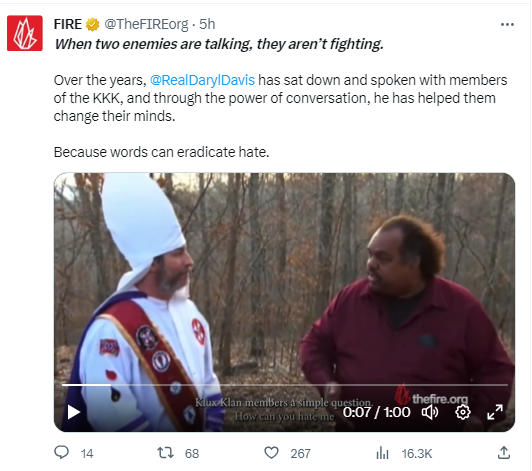Section 3 of the Fourteenth Amendment provides as follows:
Section 3 Disqualification from Holding Office
No person shall be a Senator or Representative in Congress, or elector of President and Vice-President, or hold any office, civil or military, under the United States, or under any State, who, having previously taken an oath, as a member of Congress, or as an officer of the United States, or as a member of any State legislature, or as an executive or judicial officer of any State, to support the Constitution of the United States, shall have engaged in insurrection or rebellion against the same, or given aid or comfort to the enemies thereof. But Congress may by a vote of two-thirds of each House, remove such disability.
At Reason, Constitutional Law Scholar Eugene Volokh takes a close look at the meanings of "insurrection" and "rebellion," as used in Section 3 of the Fourteenth Amendment to the U.S. Constitution. Why is this important, even for those of us who are not supporters of Donald Trump? Volokh notes that several serious legal scholars with solid conservative credentials are proposing a broad interpretation of this constitutional provision and its related enforcement statute:
Congress has enacted a statute, 18 U.S.C § 2383, which covers participation in rebellion or insurrection, and which provides that those found guilty "shall be incapable of holding any office under the United States."
It is noteworthy that not one of the hundreds of people so far prosecuted for their Jan 6 misconduct (not even Donald Trump) has been criminally charged with "insurrection under Section 2383.
Volokh cautions that we should be wary of interpreting these terms loosely, in that they allow political operatives to disqualify their opponents from running, something that we instinctively find to be cringe-worthy when we see it in other countries.
If abused, this is profoundly anti-democratic. "The right to vote freely for the candidate of one's choice is of the essence of a democratic society, and any restrictions on that right strike at the heart of representative government." Reynolds v. Sims, 377 U.S. 533, 555 (1964). The broader and more nebulous the definition of engaging in insurrection, and the fewer the procedural safeguards, the greater the danger.
About the terminology:
Section 3 speaks of "insurrection" and "rebellion." These are demanding terms, connoting only the most serious of uprisings against the government, such as the Whisky Rebellion and the Civil War. The terms of Section 3 should not be defined down to include mere riots or civil disturbances, which are common in United States history. Many of these riots impede the lawful operations of government, and exceed the power of normal law enforcement to control. Are they insurrections or rebellions, within the meaning of Section 3?
I have not done the historical work to speak with confidence, but I would hazard the suggestion that a riot is the use of violence to express anger or to attempt to coerce the government to take certain actions, while insurrections and rebellions are the use of violence, usually on a larger scale, to overthrow the government or prevent it from being able to govern.
I was personally outraged by the January 6 incursion, because I consider the Capitol to be a sacred civic space. Making things even worse, Congress was in session, meaning that the trespassers were directly interfering with the operation of my government. I am happy to see all those involved aggressively prosecuted. That said, I am also highly concerned that the U.S. Government itself, though its law enforcement arms (including the FBI), encouraged the protestors to invade the Capitol. See here and here and here and here. But then, on July 13, 2022, the NYT, which has generally been horrified by the January 6 incursion, published this bizarre article sympathetic to Ray Epps, who is on several January 6 videos encouraging protestors to go into the Capitol. Follow up NYT story on July 14, 2022. Consider the second paragraph to the July 13 NYT story:
Ray Epps has suffered enormously in the past 10 months as right-wing media figures and Republican politicians have baselessly described him as a covert government agent who helped to instigate the attack on the Capitol last year.
Completely befuddled by the slant of this NYT coverage of Ray Epps, Tucker Carlson commented: "It's all very strange. The New York Times is mounting a propaganda campaign on behalf of a self-described Trump voter insurrectionist." Enough of this detour for now. Back to the Constitutional analysis.
Volokh also looks closely at the Constitutional requirement that one "engage in" one of these prohibited activities in order to be barred from office. In Volokh's analysis, barring someone from running for office requires more than applauding on the sidelines:
Moreover, Section 3 uses the verb "engage in," which connotes active involvement and not mere support or assistance. Significantly, Section 3 also uses the term "give aid and comfort to"—but this is reserved for giving aid and comfort to the "enemies" of the United States, which has historically meant enemies in war. Bas v. Tingy (1800). That Section 3 uses both terms, with different referents, strongly suggests that "engage in" means more than just give "aid and comfort" to an insurrection... In the absence of actual engagement in actual insurrection, judged as such by competent authorities, we should allow the American people to vote for the candidates of their choice.



